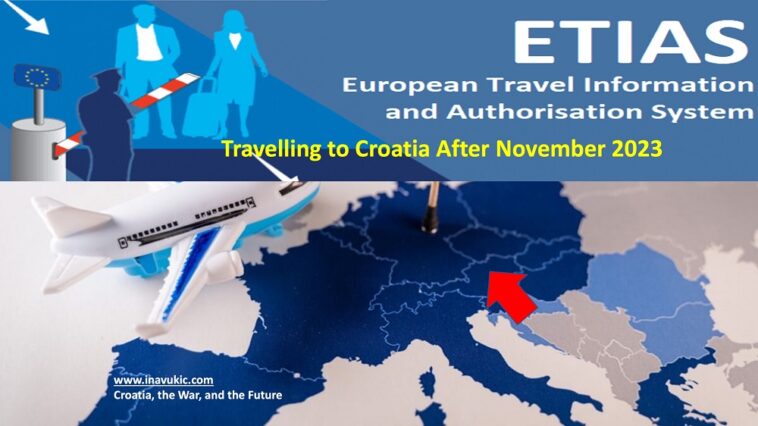There are two significant changes that will occur in and for Croatia in 2023.
On January 1, 2023, Croatia will bid farewell to its beloved currency, the Kuna, the symbol of its hard-won independence from communist Yugoslavia in the 1990’s, to become the 20th member of the Eurozone. This is occurring in the worrisome environment of mounting inflation and precarious geopolitical headwinds rattling Europe but, regardless, official Croatia hopes that its upcoming switch to the Euro will bring some semblance of protection in an uncertain world. That, of course, is debatable in a mad world where chaos can quickly turn heads and overtake as people’s pockets become hit hard and bare survival at a decent standard is threatened. In the build-up to the changeover, authorities in Croatia have been constantly hammering home the advantages of adopting the Euro for the country’s 3.9 million people. Parliamentary opposition in Croatia, however, the centre-right and right or the so-called patriotic milieu, have expressed their opposition to the introduction of the Euro on both rising living costs base and the patriotic one that holds fast to the concept and factors that define Croatia’s sovereignty.
Then, the EU will be meeting on December 9, 2022, and, given that Slovenia now supports the move, it is planned and expected that this meeting should decide a swift accession of Croatia to the Schengen border-free zone. The matter of Croatia’s accession into the Schengen area should be decided by the EU’s Justice and Home Affairs Council when it meets in December this year. Do not be surprised if this swiftness means January 2023. That is, that Croatia becomes Schengen Zone member state in the same month of 2023 in which it says farewell to its Kuna currency and adopts the Euro.
An EU member since 2013, official Croatia has long been aiming to join the Schengen Zone, a common area of travel without border protocol enjoyed by 22 of the 27 EU countries, plus EFTA states (European Free Trade Association) including Switzerland.
A heavy load on minds and in hearts of multitudes of Croatians is that once Croatia enters the Schengen Zone foreigners will be able to purchase agricultural land in Croatia without any restrictions, that sense of and moral and cultural richness in being Croatian in a Croatian nation will be eroded rather swiftly and Croatia become a drop in a bucket of different nations that have little in common bar the need to implement laws and expectations of the EU more now than before Schengen. How much strength and winds of change are hidden behind the parliamentary opposition parties who in their majority walked out of the parliament a couple of weeks ago, refusing to listen to the Prime Minister’s annual report, will surely be revealed more and more, especially as 2024 general elections are coming closer and closer each day. However, the Euro and Schengen are to stay for Croatia if it is a member state within the EU.
Travelling within the Schengen Zone means that visitors arriving from a fellow Schengen country do not have to show their passports and can walk through airports and over border crossings as if they were still in their own country. This facility will obviously benefit a nation reliant on tourism, such as Croatia.
Numerous people, living outside the Schengen area, including those with dual citizenship that includes the Croatian one, have been wondering if they will need a Schengen Visa if they plan on travelling there and staying for up to 90 days for holidays or business. The current situation with Schengen Visa is that the Schengen visa is the most common visa for Europe. It enables its holder to enter, freely travel within, and leave the Schengen zone from any of the Schengen member countries. There are no border controls within the Schengen Zone.
Each member country of the Schengen zone can issue Schengen visas. However, citizens of third countries (e.g. USA, Canada, Australia, New Zealand …) do not need a Schengen Visa in order to enter and move around the Schengen countries because the Schengen countries have reached a visa-liberalisation agreement with the Schengen member states. However, there are third countries that have not yet reached a visa-liberalisation agreement and their citizens must apply for a Schengen Visa before entry; these countries are listed on the Schengen Visa website https://www.schengenvisainfo.com/who-needs-schengen-visa/
But, if you are planning to study, work, or live in one of the Schengen countries for more than 90 days, then you must apply for a national visa of that European country and not a Schengen Visa.
Although the laws regarding dual citizenship are very different in some parts of the world the concept is well established and recognised throughout the European Union. For this reason, a person holding valid passports from two EU member countries, e.g. French and German passports, may use either when travelling and no questions will be asked. This is a simple example, but the same principle applies if one of the passports has been issued by a non-EU member state (e.g., Australia, USA, Canada). The traveller can simply use the valid EU passport (issued by an EU member country, e.g., Croatia, Germany…) and travel through Europe as per his or her rights as a citizen of the European Union.
Matters regarding Visas or clearance to travel for people traveling into EU and Schengen Zone from third countries, non-EU or non-Schengen countries are set to change once the launch of the new travel clearance systems ETIAS (European Travel Information and Authorisation System) and EES (Entry and Exit System) is complete. Having been delayed It is estimated the launch of EES will now be around May 2023 and the ETIAS in November 2023.
The new system called the EES (entry and exit system) will change the current process in two main ways:
- In addition to the information in passports, the system will take biometric data (fingerprints and facial images) and store them for future reference—in much the same way as the U.S. currently does.
- Instead of passport stamps—which can be time-consuming as dates have to be checked manually—the system will automatically record exactly when someone entered the country, so it will automatically know if they have overstayed their welcome.
The European Travel Information and Authorisation System (ETIAS) will oblige visitors from outside Europe to apply for a visa-waiver before arriving at a country that is in the Schengen zone. ETIAS will work much like the U.S. ESTA scheme, costing about €7 per registration and lasting for 3 years of unlimited number of entries for and applicants under the age of 18 and over 70 will receive their ETIAS free of charge. Anyone travelling from one of over 63 countries currently not needing a visa for EU or Schengen Zone will need an ETIAS, including Argentina, Australia, Brazil, Canada, Japan, New Zealand, the U.S., the U.K. and the UAE.
Hence, ETIAS approval will only be necessary for passports issued in countries outside the EU and Schengen Area. In order to enter Europe after 2023 it will be necessary to possess either a valid passport issued from a Schengen or EU country or an ETIAS approved passport.
Having dual citizenship can help avoid the necessity, expense, and bother of applying for ETIAS but this may not always be avoidable.
In the simplest terms:
Holding dual citizenship in two non-EU countries – ETIAS will be required.
Citizenship of an EU country and a non-EU country – NO ETIAS will be required.
If a citizen of any third country is entitled to, and can acquire, a passport from any of the EU or Schengen states then he or she is entitled to use that passport for visiting Europe as such passports do not require ETIAS approval.
Therefore things are such that having dual citizenship that includes an EU member state citizenship (e.g. Croatian) has enormous benefits and these also include: https://www.schengenvisainfo.com/eu-citizenship/dual-citizenship/
- You can live, work, and even retire in any of these countries with no restrictions. You can do the same in Iceland, Liechtenstein, Norway, and Switzerland, which aren’t part of the EU.
- Dual citizenship allows you to both vote and run for office, just like a citizen of the country where you choose to live. Moreover, as an EU citizen, you can work in a public service position.
- Through dual EU citizenship, you can access some of the best universities in the world, with excellent quality and no extra tuition or reduced tuition. As an EU citizen, you don’t need a student visa to earn subsidised degrees in business administration, social sciences, IT, journalism, and law.
- If you want to buy a property in any EU country, you can do this without a permit from the moment that you obtain an EU dual citizenship. You are free to choose any EU member state and begin living there.
- Eu dual citizenship gives you the right to have healthcare access in any EU country. If you need medical coverage when you’re living, studying, and travelling between EU states. Although EU countries have different healthcare systems and you should check your rights directly, the European health insurance cardcovers you in the whole area.
- As an EU citizen, you can start your own business and access different EU funds. Starting a new company can be easy because you can apply for financial aid from investment platforms that are ready to support new businesses.
While the global increase of expatriate dual citizenship acceptance over the past decades has been widely observed the same is the case for dual citizenship with Croatia within the diaspora population and its youth and newborns. This is to be encouraged as far as I am concerned as the mere existence if dual citizenship does strengthen one’s identity and awareness of family roots and culture. Ina Vukic




